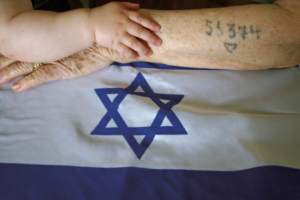Supporting Holocaust Survivors During Attacks Against Israel and A Rise in Anti-Semitism
Israel is once again under attack, this time by Hamas, a terrorist organization that rules Gaza. These heinous acts are distressing for many Jews, especially Holocaust survivors. Many survivors say they feel safe in the world as long as the people of Israel are safe and Israel’s borders are secure. Survivors have ties to their beloved State in numerous ways. Some have family and friends who live there. Others support hospitals and organizations that provide services to Israelis. And still, others see it as their ancestral home.
In addition to attacks on Israel, we are also experiencing a rise in anti-Semitism in Canada, The United States, and around the world. For example, anti-Israel protests have turned violent, Jewish Canadians are being threatened and in some instances attacked physically just for being Jewish.
And how are survivors responding to these events?
Some become distressed because they are reminded of the prejudice against Jews and acts of violence that spread throughout Europe before the Holocaust. They are afraid current anti-Semitism will lead to another Holocaust. These survivors suffer in silence and experience anxiety, fear, withdrawal, nightmares, and sleeplessness. Others are worried, not so much for themselves, but for the harm that may befall their children, grandchildren, and great-grandchildren. Still, others become angry and strengthen their resolve to educate others about the early warning signs of genocide and its prevention. For them “Never Again” is not an empty slogan. They are speaking to students and other interested individuals about their personal experiences and participating in the Claims Conference campaign, “It Started With Words.”
It is important for service providers to identify vulnerable survivors who are disturbed by these anti-Israel and anti-Semitic events and provide them with support in the following ways:
- Reach out to vulnerable survivors and ask them how they’re coping with the current Israeli state of affairs and rise in anti-Semitism. Let them know you’re thinking about them. It makes them feel supported by a Jewish agency and its workers.
- Listen as survivors share their thoughts and feelings. When they do, use normalizing statements such as “What you are feeling are normal reactions and many people are feeling the same way.”
- Encourage survivors to seek support and reach out to their family, friends, and other interested individuals about their concerns. Giving a voice to their worries and/or fears helps to diffuse them.
- Many survivors are watching television news channels throughout the day, listening to the radio, and surfing the Internet. They feel the responsibility to remain vigilant and closely monitor the media, even though it affects their physical and psychological health. Give them permission to turn off their news channels. Ask them if they are willing to limit watching/listening to these programs and if they are, ask them what times of the day feel right for them. Suggest they not watch the news before bedtime because it may impact their ability to fall or stay asleep.
- Ask survivors to identify ways in which the situation for Jews is different today in Canada and the United States than it was in the 1930s, e.g. Jews are no longer powerless; we are standing up to hatred and fighting back; Israel is a strong State, capable of defending itself; law enforcement is on our side; there are no Brownshirts violently attacking, arresting us and sending us to concentration camps.
- Many survivors are knowledgeable about the current political situation. Ask them to share this information with you, contributing to a reciprocal learning process.
- Inform them that 25 countries (Canada, US, Austria, Germany, Ukraine, Brazil, Australia, Hungary, etc.) are standing with Israel and supporting her right to self-defense against terrorist attacks. When Holocaust survivors witness countries condemning these activities and supporting the Jewish community, it reassures them that the political situation is different today than in the 1930s. Survivors realize they are not alone and have allies in denouncing these heinous events. Public expression of support and solidary with the Jewish community helps appease survivors’ fears and anxieties and brings them some comfort.
- Many survivors are unable or unwilling to attend pro-Israel community rallies because of health conditions or fear of contracting COVID-19. Show them photos of these rallies or tell survivors about them so they can stand in solidarity with their fellow Jews.
- Encourage survivors to practice self-care, e.g. eat comfort foods; exercise; engage in social activities; seek distraction by participating in a pleasurable activity; and practice relaxation exercises such as deep diaphragmatic breathing (making the exhalation through the mouth twice as long as the inhalation through the nose).
- Just before they fall asleep, ask them to think of 3 things that happened during the day for which they are grateful.
Myra Giberovitch’s message to service providers:
Helping Holocaust survivors recover from their traumatic ordeals has been my life’s work for 30 years. I derive great satisfaction from providing you, the service providers who work with them, with information and tools to enhance your practice skills. Many of these strategies are discussed in my book, Recovering from Genocidal Trauma: An Information and Practice Guide for Working with Holocaust Survivors. Your role is not an easy one. It requires special understanding, knowledge, and sensitivity to work with survivors. I believe it’s important for each of us to make the last stage of survivors’ lives as comfortable as possible by providing them with specialized and compassionate services, embraced by communities that care about them. And that’s exactly what you and the agencies you work for are doing. So kudos everyone! If you have a question, would like more information, or to book a training, please check out my website www.myragiberovitch.com or contact me at myra@myragiberovitch.com. Also, please view my TED talk about survivors’ contributions.




